人教版九年级英语unit 1单词讲解(leo)
人教版九年级英语上册Unit 1单词及重点短语(附例句)
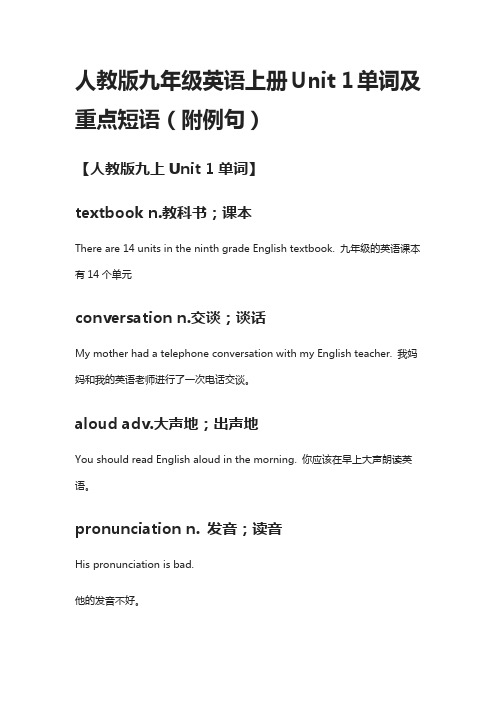
人教版九年级英语上册Unit 1单词及重点短语(附例句)【人教版九上Unit 1单词】textbook n.教科书;课本There are 14 units in the ninth grade English textbook. 九年级的英语课本有14个单元conversation n.交谈;谈话My mother had a telephone conversation with my English teacher. 我妈妈和我的英语老师进行了一次电话交谈。
aloud adv.大声地;出声地You should read English aloud in the morning. 你应该在早上大声朗读英语。
pronunciation n. 发音;读音His pronunciation is bad.他的发音不好。
sentence n.句子My sister is too young to speak out a complete sentence. 我妹妹太小了,还不能说出一个完整的句子。
patient adj.有耐心的n.病人Doctors always take care of every patient patiently. 医生总是耐心地照顾每个病人。
She is patient with everything.她对一切都很有耐心。
expression n.表达(方式);表示There was an expression of joy on her face when she heard the exciting news.当她听到这个令人兴奋的消息时,脸上露出了喜悦的表情。
discover v.发现;发觉Scientists are working to discover a better way to fight air pollution. 科学家们正在努力寻找防治空气污染的更好方法。
九年级英语人教版unit1知识点归纳

九年级英语人教版unit1知识点归纳Unit 1: FriendshipIntroduction:Friendship is a cherished and essential part of our lives. It is the bond that connects people, providing support, understanding, and loyalty. In the ninth-grade English curriculum, Unit 1 of the People's Education Press introduces various aspects of friendship. This unit includes important knowledge points that help students understand the significance of friendship and develop their interpersonal skills. Let's delve deeper into these key concepts.1. Vocabulary and phrases:In this unit, students are introduced to a range of vocabulary and phrases related to friendship. These words and expressions enable students to effectively communicate their thoughts and feelings about friendship. Some important vocabulary words include "acquaintance," "buddy," "loyal," "confide," "betray," and "empathy." By understanding these words, students can articulate their ideas and engage in meaningful conversations about friendship.2. Grammar:Unit 1 also focuses on grammar points that help students construct grammatically correct sentences while discussing friendship. Some crucial grammar rules covered in this unit include the use of adjectives, adverbs, and comparative and superlative forms. For instance, students learn how to describe a true friend by using adjectives such as "trustworthy," "reliable," and "compassionate." This knowledge enhances their ability to express their opinions and effectively communicate with others.3. Reading comprehension:Through various reading passages, students get the opportunity to develop their reading comprehension skills while exploring the topic of friendship. These passages are designed to enhance vocabulary, improve reading speed, and most importantly, promote critical thinking. Students are encouraged to analyze the characters' actions and motives, predict outcomes, and draw conclusions. This not only strengthens their reading skills but also instills in them a deeper understanding of the complexities of human relationships.4. Listening skills:Listening skills play a crucial role in effective communication and understanding others. Unit 1 provides ample opportunities for students to enhance their listening skills through dialogues and audio clips aboutfriendship. By practicing listening to different accents, understanding varying speech speeds, and identifying key information, students become more confident in their ability to comprehend spoken English. Developing active listening skills enables them to engage more actively in conversations and build stronger friendships.5. Writing:Unit 1 focuses on improving students' writing skills, allowing them to express their thoughts about friendship through various written forms. Students are encouraged to write personal narratives, persuasive essays, and informal letters discussing their experiences, opinions, and reflections on friendship. Through this writing practice, students develop their creativity, organization, and coherence in constructing meaningful and impactful pieces of writing.6. Cultural understanding:Unit 1 also integrates cultural aspects into the curriculum, introducing students to friendship customs and traditions from different countries. By learning about how friendship is valued and celebrated in different cultures, students gain a broader perspective on the significance of friendships in society. This cross-cultural understanding fosters empathy and respect for diversity, enhancing their interpersonal skills in a globalized world.Conclusion:Unit 1 of the ninth-grade English curriculum offers an extensive exploration of the concept of friendship. Providing knowledge in vocabulary, grammar, reading comprehension, listening skills, writing, and cultural understanding, this unit equips students with the necessary tools to establish and maintain meaningful relationships. By delving into these key concepts, students not only improve their English language proficiency but also gain valuable insights into the significance of friendship in their lives.。
人教版九年级英语unit one词汇解析
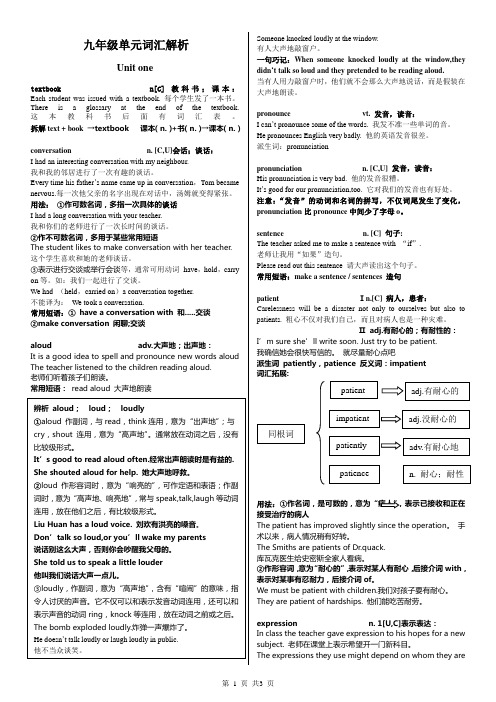
九年级单元词汇解析Unit onetextbook n[C] 教科书;课本:Each student was issued with a textbook. 每个学生发了一本书。
There is a glossary at the end of the textbook. 这本教科书后面有词汇表。
拆解text + book →textbook 课本(n.)+书(n.)→课本(n.)conversation n. [C,U]会话;谈话:I had an interesting conversation with my neighbour.我和我的邻居进行了一次有趣的谈话。
Every time his father’s name came up in conversation,Tom became nervous.每一次他父亲的名字出现在对话中,汤姆就变得紧张。
用法:①作可数名词,多指一次具体的谈话I had a long conversation with your teacher.我和你们的老师进行了一次长时间的谈话。
②作不可数名词,多用于某些常用短语The student likes to make conversation with her teacher. 这个学生喜欢和她的老师谈话。
③表示进行交谈或举行会谈等,通常可用动词have,hold,carry on等。
如:我们一起进行了交谈。
We had (held,carried on)a conversation together.不能译为:We took a conversation.常用短语:①have a conversation with 和.....交谈②make conversation 闲聊;交谈aloud adv.大声地;出声地:It is a good idea to spell and pronounce new words aloud The teacher listened to the children reading aloud.老师们听着孩子们朗读。
九年级英语人教版全一册_第一单元词汇讲解
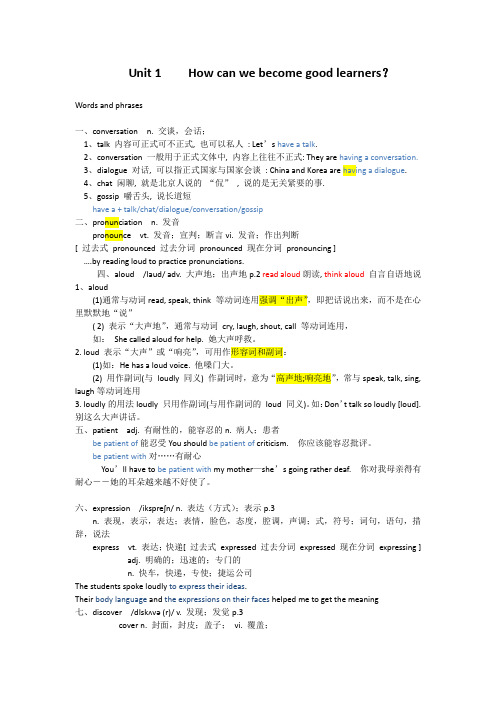
Unit 1 How can we become good learners?Words and phrases一、conversation n. 交谈,会话;1、talk 内容可正式可不正式, 也可以私人: Let’s have a talk.2、conversation 一般用于正式文体中, 内容上往往不正式: They are having a conversation.3、dialogue 对话, 可以指正式国家与国家会谈: China and Korea are having a dialogue.4、chat 闲聊, 就是北京人说的“侃”, 说的是无关紧要的事.5、gossip 嚼舌头, 说长道短have a + talk/chat/dialogue/conversation/gossip二、pronunciation n. 发音pronounce vt. 发音;宣判;断言vi. 发音;作出判断[ 过去式pronounced 过去分词pronounced 现在分词pronouncing ]….by reading loud to practice pronunciations.四、aloud /laud/ adv. 大声地;出声地p.2 read aloud朗读, think aloud自言自语地说1、aloud(1)通常与动词read, speak, think 等动词连用强调“出声”,即把话说出来,而不是在心里默默地“说”( 2) 表示“大声地”,通常与动词cry, laugh, shout, call 等动词连用,如:She called aloud for help. 她大声呼救。
2. loud 表示“大声”或“响亮”,可用作形容词和副词:(1)如:He has a loud voice. 他嗓门大。
(2) 用作副词(与loudly 同义) 作副词时,意为“高声地;响亮地”,常与speak, talk, sing, laugh等动词连用3. loudly的用法loudly 只用作副词(与用作副词的loud 同义)。
人教版九年级英语上册(Unit1单词 短语 句式 知识梳理 精讲)
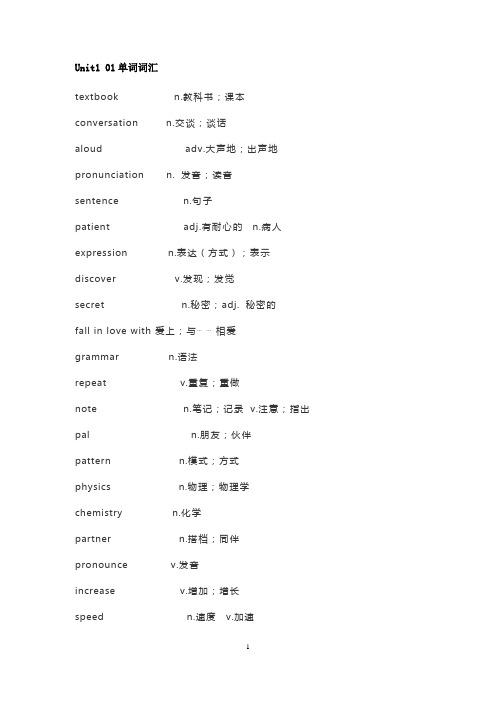
我今天上午做完了作业。
When did you finish drawing the picture?
你什么时候画完那幅画的?
【拓展】能接v.-ing作宾语的动词还有:practice; enjoy; mind; keep等。
practice doing sth.练习做某事
我们还没找到如何改进它的办法。
You’d better work out a plan to improve your writing skills.
你最好制定一个提高写作能力的计划。
We are always seeking to improve productivity.
我们一直在设法提高生产率。
enjoy doing sth.喜欢做某事
mind doing sth.介意做某事
keep doing sth.一直做某事
2. afraid
(1)be afraid表示“害怕做某事”或“不敢做某事”,be afraid之后可接不定式,也可接名词、代词或of doing sth.。例如:
She was afraid to tell you.她害怕告诉你。
I recognized his voice.我辨认出了他的声音。
I recognized her as my friend’s daughter.
我认出了她是我朋友的女儿。
(2)recognize还可以表示“清楚知道;认定”的意思。例如:
I recognized him to be cleverer than I am.
She is afraid of going out alone late at night.
Unit1重点知识总结人教版九年级英语全册
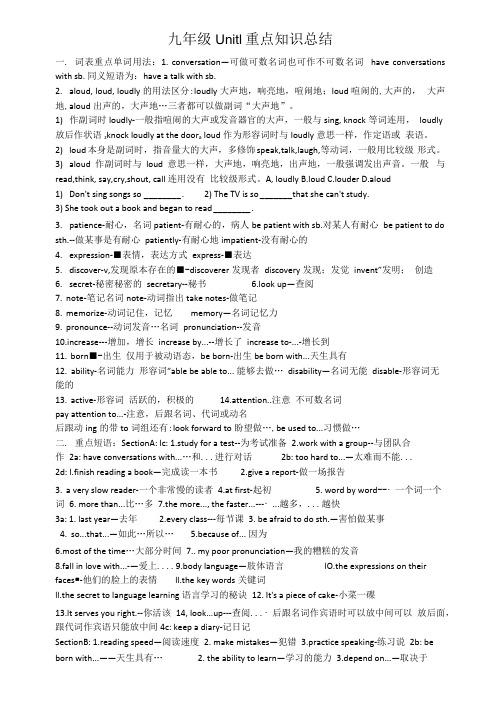
九年级Unitl重点知识总结一. 词表重点单词用法:1. conversation—可做可数名词也可作不可数名词have conversations with sb. 同义短语为:have a talk with sb.2.aloud, loud, loudly的用法区分:loudly大声地,响亮地,喧闹地;loud喧闹的,大声的,大声地,aloud出声的,大声地…三者都可以做副词“大声地”。
1)作副词时loudly-一般指喧闹的大声或发音器官的大声,一般与sing, knock等词连用,loudly放后作状语z knock loudly at the door a loud作为形容词时与loudly意思一样,作定语或表语。
2)loud本身是副词时,指音量大的大声,多修饰speak,talk,laugh,等动词,一般用比较级形式。
3)aloud作副词时与loud意思一样,大声地,响亮地,出声地,一般强调发出声音。
一般与read,think, say,cry,shout, call 连用没有比较级形式。
A, loudly B.loud C.louder D.aloud1)Don't sing songs so ________ . 2) The TV is so _______ t hat she can't study.3) She took out a book and began to read ________ .3.patience-耐心,名词patient-有耐心的,病人be patient with sb.对某人有耐心be patient to do sth.--做某事是有耐心patiently-有耐心地impatient-没有耐心的4.expression-■表情,表达方式express-■表达5.discover-v,发现原本存在的■-discoverer发现者discovery发现;发觉invent”发明;创造6.secret-秘密秘密的secretary--秘书 6.look up—查阅7.note-笔记名词note-动词指出take notes-做笔记8.memorize-动词记住,记忆memory—名词记忆力9.pronounce--动词发音…名词pronunciation--发音10.increase---增加,增长increase by...--增长了increase to-...-增长到11.born■-出生仅用于被动语态,be born-出生be born with...天生具有12.ability-名词能力形容词“able be able to...能够去做… disability—名词无能disable-形容词无能的13.active-形容词活跃的,积极的14.attention..注意不可数名词pay attention to...-注意,后跟名词、代词或动名后跟动ing的带to词组还有:look forward to盼望做…,be used to...习惯做…二. 重点短语:SectionA: lc: 1.study for a test--为考试准备 2.work with a group--与团队合作2a: have conversations with...…和...进行对话2b: too hard to...—太难而不能...2d: l.finish reading a book—完成读一本书 2.give a report-做一场报告3.a very slow reader-一个非常慢的读者4.at first-起初5. word by word--・一个词一个词 6. more than...比…多7.the more..., the faster...---・...越多,...越快3a: 1. last year—去年 2.every class---每节课3. be afraid to do sth.―害怕做某事4.so...that...—如此…所以…5.because of...因为6.most of the time…大部分时间7.. my poor pronunciation—我的糟糕的发音8.fall in love with...-—爱上....9.body language—肢体语言lO.the expressions on their faces■-他们的脸上的表情ll.the key words关键词ll.the secret to language learning语言学习的秘诀12. It's a piece of cake-小菜一碟13.lt serves you right.--你活该14, look...up---查阅...・后跟名词作宾语时可以放中间可以放后面,跟代词作宾语只能放中间4c: keep a diary-记日记SectionB: 1.reading speed—阅读速度2. make mistakes—犯错3.practice speaking-练习说2b: be born with...——天生具有… 2. the ability to learn—学习的能力3.depend on...—取决于4.have...in common---在...有共同点be interested in...---对…感兴趣5. for a long time---很久时间5.connect..with...---把…和…联系一起7. for example---比如8.sports programs-运动节目9. get bored—变得枯燥10. even if一即使11. use it or lose it-■■要么得到,要么失去12.be afraid of doing sth..—害怕做... 13. take notes—做笔记14. draw mind maps—画思维导图15. look for ■■寻找16. ways to review…复习的方法17.find out---找出18.knowledge comes from questioning--知识来自提问18.Learning is a lifelong journey.--学习是漫长的过程Self Check: l.bit by bit-一点、_点、worry about-担心...三. 语法重点:1.1)表做某事方式时,用介词by. By后接动词时常跟动词ing形式,表用… 手段/方式。
九年级unit1单词讲解课件(PPT42张)

look for 寻找 look like 看起来像 look down 向下看
Unit 1
grammar [ˈgræmə(r)] n. 语法
eg: I want to learn new words and more grammar so that I can have a better understanding of English movies.
eg: It's difficult for me to memorize all these English words. memory 记忆 n.
Unit 1
pattern [ˈpætn] n. 模式,方式
eg: I usually practice my English by memorizing sentence patterns.
Unit 1
pal [pæl] n. 朋友,伙伴
eg: I improve my writing by writing e-mails to my pen pals. I met a pal of mine on my way home.
Unit 1
physics [ˈfɪzɪks] n. 物理,物理学
eg: Do you learn English by reading aloud(朗读)? 辨析aloud, loud和loudly aloud侧重强调“出声地”,loud和loudly侧重强调“大 声地”,而loud多用比较级 (loud也可作形容词)。 eg: Please read this text aloud.
Unit 1
look up (在字典、参考书中或通过电脑)查阅,抬头看
eg: I didn’t understand these sentences at first but I
人教版初三英语上unit1知识点讲解及练习.docx
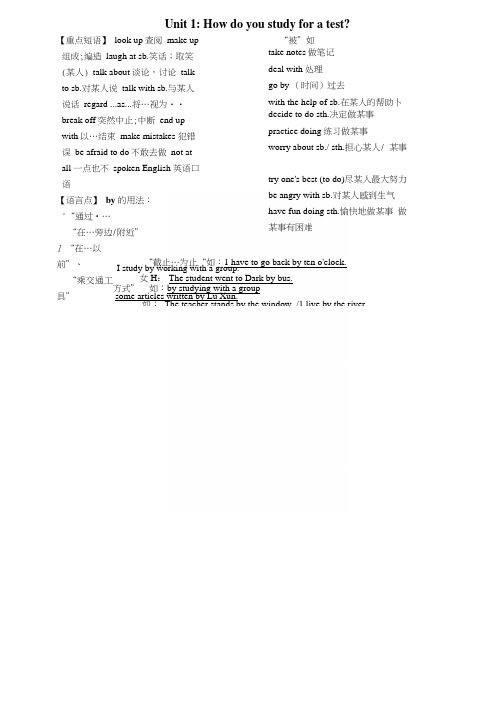
Unit 1: How do you study for a test?【重点短语】 look up 查阅 make up组成;编造 laugh at sb.笑话;取笑(某人) talk about 谈论,讨论 talkto sb.对某人说 talk with sb.与某人说话 regard ...as...将…视为・・break off 突然中止;中断 end up with 以…结束 make mistakes 犯错误 be afraid to do 不敢去做 not atall 一点也不 spoken English 英语口语【语言点】 by 的用法: '“通过•… “在…旁边/附近”1 “在…以前”、“乘交通工具” “被”如 take notes 做笔记deal with 处理 go by (时间)过去with the help of sb.在某人的帮助卜 decide to do sth.决定做某事 practice doing 练习做某事worry about sb./ sth.担心某人/ 某事 try one's best (to do)尽某人最大努力 be angry with sb.对某人感到生气 have fun doing sth.愉快地做某事 做某事有困难I study by working with a group.方式” 如:by studying with a group如: The teacher stands by the window. /1 live by the river. “截止…为止“如:1 have to go back by ten o'clock. 女H : The student went to Dark by bus. some articles written by Lu Xun.2・ practice 的用法:Do you ever practice conversations with your friends?r un."实践,练习,锻炼":Practice makes perfect.熟能生巧。
- 1、下载文档前请自行甄别文档内容的完整性,平台不提供额外的编辑、内容补充、找答案等附加服务。
- 2、"仅部分预览"的文档,不可在线预览部分如存在完整性等问题,可反馈申请退款(可完整预览的文档不适用该条件!)。
- 3、如文档侵犯您的权益,请联系客服反馈,我们会尽快为您处理(人工客服工作时间:9:00-18:30)。
人教版九年级单词
Until
1.textbook /ˈtekstbʊk/ n. 教科书;课本I took out my textbook before the teacher came in.
2.conversation /ˌkɒnvəˈseɪʃn/ n. 交谈;谈话The teacher had a conversation with my mom.
3.aloud /əˈlaʊd/ adv. 大声地;出声地We read the textbook aloud in class. The TV is too loud.
Don’t speak loudly when your father is working in the room.
4.pronunciation / prəˌnʌnsiˈeɪʃn/ n. 发音;读音I hope to improve my pronunciation.
5.sentence / 'sentəns/ n. 句子Can you read this sentence for me?
6.patient / 'peɪʃnt/ adj. 有耐心的n. 病人As a patient, you should be patient.
7.expression /ɪk'spreʃn/ n. 表达(方式);表示There was a worried expression on her face. be worried about
8.discover / dɪ'skʌvə(r)/ v. 发现;发觉Who discovered America?
9.secret / 'si:krət/ n. 秘密;秘诀adj. 秘密的;保密的I have a secret to tell you.
10.look up (在词典、参考书中或通过电脑)查阅;抬头看I looked up the flight in the timetable.
look at________look for_____look over_______look forward to doing________ look through________look after_______ look back__________look about/around_________ look out_________ look into_________ look down________
11.grammar /ˈgræmə(r)/ n. 语法I hate grammar. hate to do sth.______________
12.repeat / rɪ'pi:t/ v. 重复;重做All the students repeat after the teacher.
13.note / nəʊt/ n. 笔记;记录v. 注意;指出You should take notes in class.
14.pal /pæl/n. 朋友;伙伴They talk like old pals. pen pal___________
15.physics /ˈfɪzɪks/ n. 物理;物理学
16.chemistry / 'kemɪstrɪ/ n. 化学I study physics and chemistry at home.
17.memorize / 'meməraɪz/ v.记忆;记住I hope I can memorize everything you say.
18.pattern / 'pætn/ n. 模式;方式I have a regular sleeping pattern.
19.pronounce / prə'naʊns/ v. 发音
20.increase //ɪn'kri:s/ v. 增加;增长They’ve increased the price by 50%. increase to______________
21.speed / spi:d/ n. 速度The train travels at a speed of 80 kph.
22.partner / 'pɑ:tnə(r)/ n. 搭档;同伴I have a wonderful partner.
23.born / bɔ:n/ v.出生adj.天生的
24.be born with 天生具有He was born with a silver spoon in his mouth.
25.ability /ə'bɪlətɪ/ n. 能力;才能She has many different abilities.
26.creat / krɪ'eɪt / v.创造;创建He created a website for his daughter.
27.brain / breɪn/ n. 大脑Milk is good for your brain. be good at=do well in__________
be good/bad for_________________be good with__________
28.active /ˈæktɪv/ adj. 活跃的;积极的She is very active in class.
29.attention /əˈtenʃn/ n. 注意;关注Please pay attention to what I am going to say.
30.pay attention to 注意;关注
31.connect / kə'nekt/ v.(使)连接;与⋯⋯有联系You should connect the computer with the printer.
32.connect … with把⋯⋯和⋯⋯连接或联系起来
33.overnight /ˌəʊvə'naɪt/ adv. 一夜之间;在夜间over+night oversleep___________
34.review / rɪ'vju:/ v. & n. 回顾;复习We review what we learn at home.
35.knowledge /ˈnɒlɪdʒ/ n. 知识;学问The door to knowledge is study.
36.lifelong /ˈlaɪflɒŋ / adj.终身的;毕生的I believe English will become my lifelong friend.
37.wisely / waɪzlɪ/ adv. 明智地;聪明地Please use what you have wisely.
第 1 页共1 页。
